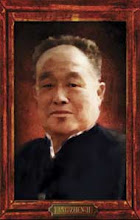Aquí les dejo una entrevista electrónica que me hicieron en Bélgica. Esta entrevista apareció originalmente en el sitio sitio de Moving as One (http://movingasone.be/e-view22.asp)
Ernesto - The teacher from Mexico
Please introduce yourself. Where are you from?
My name is Ernesto Alfaro-Moreno. I am a practitioner of traditional Yang Style Taijiquan, from the lineage of Grand Master Yang Zhenji, through Master Chris Pei (US Wushu academy) and Master Shelagh Grandpierre (Tai Chi Alliance, UK). I have been teaching since 2000 and in 2001, in conjunction with some Martial Arts friends we open The Gate of the Dragon Institute in Mexico City (www.institutolungmen.com). I come from Mexico.
When did your passion for Internal Martial Arts start?
I was interested in Chinese martial arts since I was a little boy, but in the beginning I did practice Judo. When I was 18, I did practice some style of wushu and at that time I learnt that there was something called Tai Chi Chuan. I didn't practice Tai Chi until few years later.
The first day of practice I fell in love with the art. For few years I did practice simplified forms, and then I met my current teacher, Shelagh Grandpierre, who showed me the ways of the traditional Yang Style.
Do your training sessions include a certain growth pattern for the students?
The training sessions move according to what the group need in specific moments. There is a clear idea in my head about what the students need to move forward with the different aspects of their practice, but at the same time, I try to give to every student what they need for their personal growth according to what I feel and identify in each person. It is a very personal process, and I have to be very open and sensitive. I try to relate the practice with the Daoist Philosophy. If the students are curious, but especially if he/she is ready, I suggest some books to help them grow internally.
do you create variation in your way of teaching (or training classes)?
I try to be sensitive to the needs of my students. Sometimes I have something in mind for the class, but when the students arrive, I may change my decision, because they come with too low or with too much enthusiasm. Including different aspects of the training in different amounts in different moments, helps to keep the class with a dynamics that is not the same every time. Also, following the seasons of the year can help. During the winter the training can be a bit more internal and during the summer, a bit more physical. Some days I use pushinghands and some others I bring the laptop with some clips of masters performing. If the students are tired, seat down for 15 minutes and talking about the philosophical aspects of taijiquan is also very helpful. Teaching is like pushinghands, you have to be very sensitive to understand where is the energy of the students, in order to lead them successfully.
I often notice that the students are either too stiff or too flabby which makes it difficult for them to understand the meaning of the relaxed spring-like power. Can you give some more information on relaxed spring-like power (peng)?
The secret, from my personal point of view, is related to the word relaxation. There is a huge misunderstanding of what Peng is and what Relaxation is. Some people think that in order to have Peng, you have to be hard, and some others think that Relaxation is to be soft. The true is that when doing a movement you need to be relaxed, in order to use the muscles you need for performing certain movement, with the necessary amount of force. If you use too much strength, then you become stiff, and you may overcome someone who is too soft, someone who doesn't use any muscle, worst, someone who is stiffer than you.
But this is not internal power, is pure Li (muscle). The secret is to learn the mechanics of the movement, but not only from the point of view of how should I look, but how should I get from point A to point B without using more force than the necessary and not get without any force. Once you understand these aspects, then you can create sudden changes creating the spring-like power.
How important is Bai Si to you?
The discipleship is something very important for those who want to go in deep into the art. In the traditional Chinese community there are ceremonies to accept a new disciple, which is much more committed than any regular student. In the western world we may not have that kind of "initiations" but the process also exist. A disciple is someone who takes care of the training and stop using excuses to avoid responsibilities. A disciple is someone who takes care of the teacher, with respect, with confidence. A disciple is someone who follows the teacher even when hesitation comes into the thoughts. A disciple is someone who can follow the teacher even for training under adverse conditions, without judging the decisions of the teacher (but this has to be a free process, without impositions). A disciple is by definition, a loyal person. A disciple is someone that every teacher would like to have, but you can only have a disciple when you become a Master. I am a disciple of my master, but I have no disciples. I hope, some day, I'll be able to have one.
Contact information
Ernesto Alfaro-Moreno Schapenstraat 82, B-3000, Leuven
Email: taichilungmen@gmail.com
Website: http://www.institutolungmen.com
Blog: http://www.taichilungmen.blogspot.com
Telephone: 016 291221
Mobile: 047 371 4533
Suscribirse a:
Enviar comentarios (Atom)

No hay comentarios:
Publicar un comentario